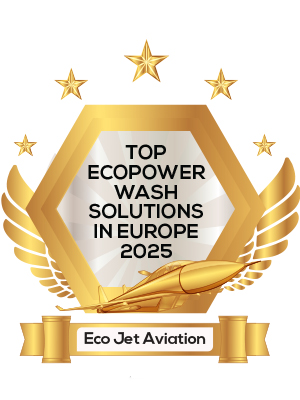THANK YOU FOR SUBSCRIBING
 Omar Vilas, CEO
Omar Vilas, CEOAviation maintenance has long been about regulatory compliance rather than performance-driven insights. Eco Jet is changing that by integrating advanced analytics, helping airlines achieve measurable improvements while strengthening sustainability efforts. Since entering the Spanish market, the company has fine-tuned its North American technology to align with European airport demands, ensuring a seamless fit into existing operations.
“We came here to change the way airlines approach decontamination,” says Omar Vilas, CEO of Eco Jet Aviation. “Now our clients see the savings and understand the real impact this has on their business.”
For airlines looking to stay ahead in an industry where margins and emissions are under constant scrutiny, Eco Jet Aviation is proving that sustainability and performance do not have to be competing priorities—they can be engineered to work in tandem.
Data-Driven Efficiency for a New Era
Before EcoPower Wash arrived in Spain, engine washing was treated as a routine task—a box to check for regulatory compliance rather than a tool for optimising performance. Airlines followed manufacturer guidelines, but the process itself was rarely questioned. That mindset shifted when Eco Jet Aviation introduced a smarter, data-driven approach, proving that proper engine decontamination could unlock measurable improvements in efficiency, sustainability, and operational costs.
-
We came here to change the way airlines approach decontamination. Now our clients see the savings and understand the real impact this has on their business
The impact has been impossible to ignore. Spanish airlines using EcoPower Wash have reduced annual fuel consumption by an average of 1.8 per cent. While that percentage may seem minor, the savings accumulate rapidly when applied across entire fleets.
With fluctuating fuel prices and sustainability under increasing scrutiny, airlines are pressured to cut costs while meeting environmental targets. EcoPower Wash directly supports both goals. Its advanced process significantly reduces CO₂ emissions, cutting thousands of tons annually while using 80 per cent less water than traditional methods. These advantages are crucial in regulated areas like Barcelona-El Prat Airport, where strict ecological policies prevent contamination risks.
The benefits of cleaner engines extend far beyond fuel savings. Engine health directly impacts an aircraft’s time in service, and with EcoPower Wash removing harmful contaminants more effectively than conventional methods, airlines are seeing a dramatic improvement in longevity. Engines remain in peak condition for longer, allowing aircraft to complete up to 2,500 additional flight cycles before major overhauls are required. That translates into fewer maintenance disruptions, lower costs, and greater fleet availability.
-2.jpg) Flexibility has been another key factor in Eco Jet Aviation’s success. Unlike generic solutions, the company designs custom wash manifolds to fit specific engine types, ensuring precise cleaning for nearly every European commercial aircraft. With over 14 manifold designs in use and new ones developed in under six weeks, airlines get tailored solutions without unnecessary downtime.
Flexibility has been another key factor in Eco Jet Aviation’s success. Unlike generic solutions, the company designs custom wash manifolds to fit specific engine types, ensuring precise cleaning for nearly every European commercial aircraft. With over 14 manifold designs in use and new ones developed in under six weeks, airlines get tailored solutions without unnecessary downtime.
Operational efficiency is another major advantage. Unlike traditional methods that require aircraft to be moved to wash bays, Eco Jet Aviation performs washes directly on the ramp, cutting turnaround times by up to 80 per cent. This keeps fleets available, schedules flexible, and operations running smoothly.
A Post-Pandemic Success Story
The true test of Eco Jet Aviation’s impact came in the aftermath of the pandemic. Contamination levels soared with planes grounded for months, and Madrid’s airport became a parking lot for idle aircraft. Engines suffered from prolonged inactivity, creating a pressing need for deep restoration.
Eco Jet Aviation combined advanced decontamination with real-time data monitoring, breathing new life into neglected engines and redefining what an engine wash program could achieve. What was once a routine maintenance task evolved into a critical tool for optimising fuel efficiency, cutting emissions, and ensuring fleet readiness.
That shift has left a lasting mark. Two years after introducing EcoPower Wash to Spain, Eco Jet Aviation is not just offering a service—it is raising the bar for aircraft maintenance. With a focus on data-driven efficiency and sustainability, the company has transformed engine decontamination from an overlooked necessity into a strategic advantage.
As aviation across the Iberian Peninsula moves toward greener, more efficient operations, Eco Jet Aviation’s success proves that the right approach to innovation can help the industry soar again.
| Share this Article: |
Eco Jet Aviation
Company
Eco Jet Aviation
Management
Omar Vilas, CEO
Description
Eco Jet Aviation specialises in sustainable on-wing engine washing using its EcoPower system. This technology reduces CO2 emissions and fuel consumption, while extending engine life and lowering maintenance costs. The company’s eco-friendly approach ensures no environmental contamination by recycling 100 per cent of the water used.






